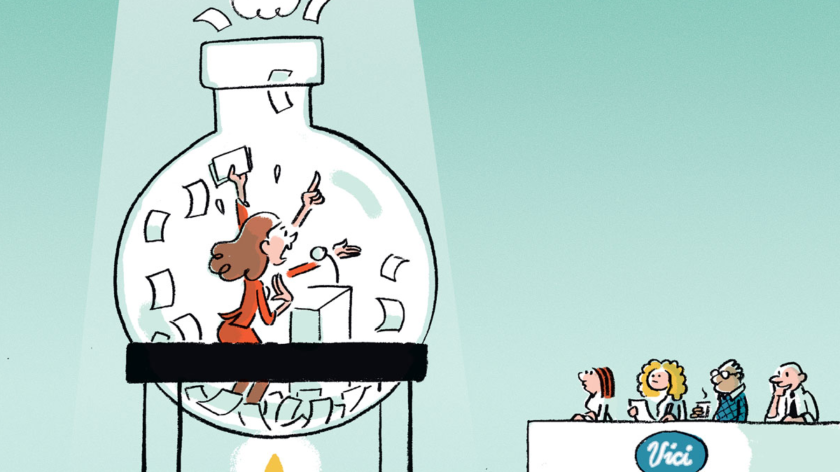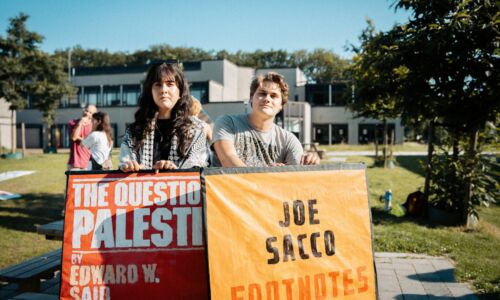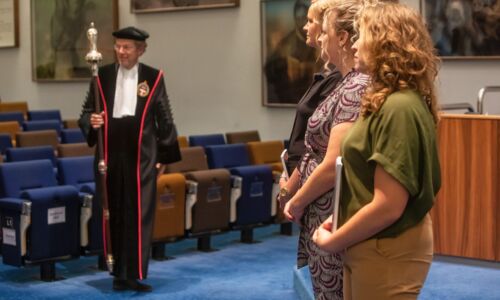Still many questions about new Vidi policy
-
 Illustratie: Roel Venderbosch
Illustratie: Roel Venderbosch
All researchers at Radboud University who are allowed to submit a Vidi application in the next round in October will receive a permanent contract. This statement was (once again) made by Rector Magnificus Han van Krieken at an informative meeting held in the Grotius Building on Monday afternoon. Researchers are concerned about the feasibility.
As of this year, researchers are allowed to submit a Vidi application to NWO only if they have a so-called ‘embedding guarantee’ from their university. Nijmegen wants to go further by giving its own researchers who submit an application a permanent contract (this does not apply to external researchers). Using this policy – ‘a pilot’ – the Executive Board wants to kill two birds with one stone: offering better career perspectives to talented researchers and maintaining control of its own personnel policy.
The selection of applicants is done at the faculty level. In consultation with the director of research and the director of education, the dean decides if a researcher is allowed to write a proposal. Agreements must be made not only about the research but also about the educational tasks. The Rector: “Research and education are interwoven at this university.” Prior to submission, the proposal must also undergo an internal quality check, followed by the permanent contract. As yesterday’s meeting showed, permanent in this case means ‘clausually permanent’ – for as long as the funding continues.
The board and the deans will discuss the new policy today; precise details will be announced in the second half of this week. “But we wanted to explain the plans now because many researchers are already working on their applications.”
Concern
Although the estimated forty people present found the idea attractive, they were concerned about its practical feasibility. And about the transparency of the selection procedure, as researchers previously told Vox. Several researchers said that their dean or director had already indicated that there simply was no financial room. An embedding guarantee, let alone a permanent contract, is not realistic. “There’s now a risk that institutes won’t allow their internal researchers to submit an application,” explained Sebo Uithol, postdoc at the Donders Centre for Cognition, expressing the concern of many of those present.
“That isn’t our intention,” the Rector responded. “Faculties are too risk-avoiding. Every year there’s money left in the budget, so there is certainly room to give people a permanent contract.” Institutes can select applicants only on scientific arguments, not financial ones. If necessary, the board will make central funds available, the Rector added. If researchers still have the idea that inappropriate reasons are involved, they can contact Van Krieken himself or policy adviser Petra Hendriks, he told his listeners.
‘Faculties are too risk-avoiding’
The Faculty of Science and the Donders Institute will experience the biggest consequences. Berend Geurts, managing director of the Donders Centre for Cognitive Neuroimaging, does not want to reveal too much about how his institute will implement the plans before they meet with the board. “That’s still a matter of discussion. We want to follow the line of the Executive Board, but we have to find a modus vivendi that is feasible in the long term, both for the institute and the people.”
Assistant Professor Janneke de Jong (Arts, “on a temporary contract”) is also sceptical about the feasibility. “The number of students at our faculty seems to be decreasing rather than rising,” she said after the meeting. “And our faculty has to restructure itself. To what extent does the board know what’s going on at the faculties?”



